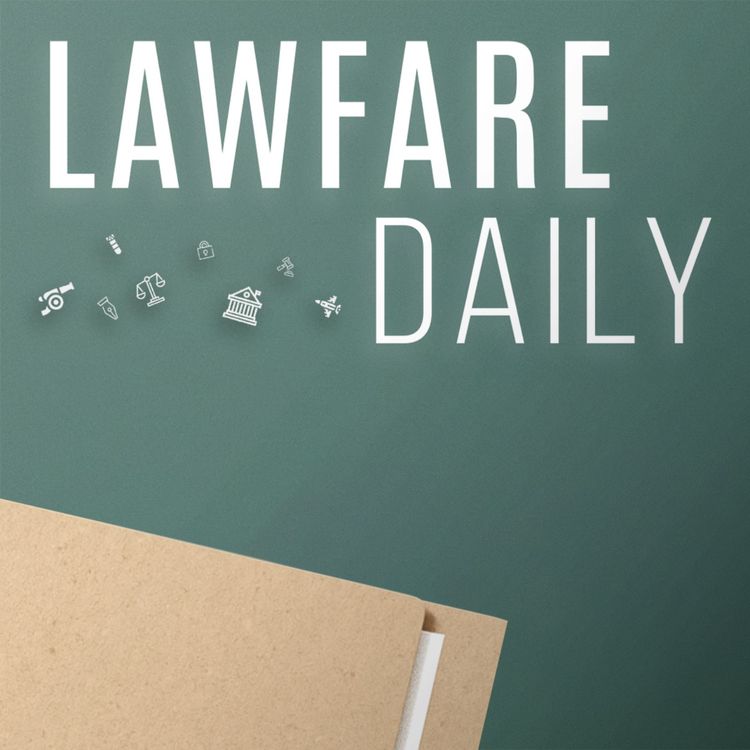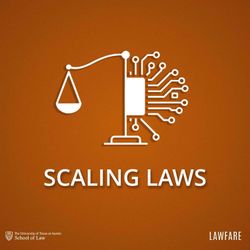Share

The Lawfare Podcast
Lawfare Archive: Can Torture Evidence Be Used at Guantanamo Bay?
From August 8, 2023: Just weeks ago, the U.S. Court of Appeals for the D.C. Circuit upheld the life sentence of a Yemeni national serving out his time at the Guantanamo Bay detention center. He had appealed this life sentence, in part on the grounds that his conviction was based on evidence obtained by torture. Meanwhile, at the Guantanamo military commissions, another detainee tried to appeal charges against him on the basis that torture-obtained evidence was used in his referral for trial by the military commissions—but in June, the body that reviews referrals for trials at Guantanamo denied this appeal. He and his co-defendants are currently set to have pre-trial hearings in October.
All of this is happening despite the fact that in 2022, in a case about a different Guantanamo detainee, the Biden administration’s Justice Department committed to a reinterpretation of a key statute that blocks the use of torture-obtained evidence in Guantanamo litigation and reaffirmed that it would not try to admit statements that the detainee gave while in CIA custody.
So how and why is it that torture-obtained evidence still seems to be being used in certain GTMO cases? To understand the issues, Lawfare Associate Editor Hyemin Han spoke to Scott Roehm, Director of Global Policy and Advocacy at the Center for Victims of Torture, and an Adjunct Professor of Law at Georgetown Law School. They talked about the history of torture evidence at GTMO, dove into a few cases in context of the Justice Department’s 2022 re-interpretation, and discussed what this all might mean for other GTMO detainees moving forward.
To receive ad-free podcasts, become a Lawfare Material Supporter at www.patreon.com/lawfare. You can also support Lawfare by making a one-time donation at https://givebutter.com/lawfare-institute.
More episodes
View all episodes

Lawfare Live: Unpacking the Kilmar Abrego Garcia Hearing with Anna Bower
28:11|In a Feb. 26 Lawfare Live, Lawfare Editor in Chief Benjamin Wittes and Lawfare Senior Editor Anna Bower discussed the evidentiary hearing in the Kilmar Abrego Garcia criminal case which focused on the motion to dismiss for vindictive prosecution. This episode is a part of Lawfare’s new livestream series, Lawfare Live: The Now. Subscribe to Lawfare on Substack or YouTube to receive an alert for future livestreams. To receive ad-free podcasts, become a Lawfare Material Supporter at www.patreon.com/lawfare. You can also support Lawfare by making a one-time donation at https://givebutter.com/lawfare-institute.
Rational Security: The “Off the Rails” Edition
01:16:33|This week, Scott was joined by Lawfare Managing Editor Tyler McBrien, Lawfare Senior Editor Molly Roberts, and University of Virginia Professor of Law Paul Stephan to talk through the week’s big news in national security, including:“Textual Healing.” On Friday, a 6-3 Supreme Court majority brought an end to at least the current iteration of President Trump’s controversial tariff policies, ruling that language in the International Emergency Economic Powers Act (or IEEPA) authorizing the “regulation of…importation” doesn’t include the authority to impose tariffs. That said, President Trump himself has already indicated that he intends to reinstate many of the tariffs he had installed using IEEPA under other statutory authorities. How big a setback is this for the Trump administration’s trade policies? And what might it mean for other aspects of its policy agenda?“Mayhem in Mexico.” Over the weekend, an elite unit of the Mexican army killed one of the country’s most powerful drug kingpins, Nemesio Oseguera Cervantes, also known as “El Mencho.” His syndicate, the Jalisco New Generation Cartel, immediately retaliated, through attacks on Mexican security forces, roadblocks throughout the country, and other measures intended to terrorize the public, particularly in areas frequented by American and Western tourists. The decision to move against El Mencho followed an intense pressure campaign by the Trump administration, which has pushed Mexican President Claudia Sheinbaum to take a hard stand against the cartels. Should this be seen as a win for the Trump administration? Or Sheinbaum? And what could the long-term implications be for the U.S.-Mexico relationship?“Clap if You Believe.” On Tuesday, President Trump delivered his annual State of the Union address, the longest of its kind. Many had braced for a contentious speech, expecting Trump to ridicule the justices seated in front of him and potentially even announce strikes on Iran. But Trump appeared to pull his punches on both of those fronts—he instead saved his harshest words for congressional Democrats and focused on laying out a rose-colored picture of the state of the country. How effective was Trump’s speech? And what does it tell us about the current state of his second presidency?In object lessons, Tyler just has this strange sense that you will enjoy the Otherworld podcast. Molly (and her dog) find comfort in the soft, squishy claws of Cthulhu. Scott eased his travel woes with a twist on the Vieux Carre at Birch & Bloom in Charlottesville. And Paul mixed his object lesson with three parts: Peter Suderman’s Cocktails if you’re into all things shaken and stirred; Mark Galeotti's podcast, In Moscow’s Shadow, if you’re into all things Russia-related; and Dan Wang’s New York Times Best Seller book, “Breakneck,” if you’re into all things China-related. To receive ad-free podcasts, become a Lawfare Material Supporter at www.patreon.com/lawfare. You can also support Lawfare by making a one-time donation at https://givebutter.com/lawfare-institute.
Lawfare Daily: The State of IHL
21:12|Loren Voss, Public Service Fellow at Lawfare, sits down with Stuart Casey Maslen, the head of the IHL in Focus project at the Geneva Academy of International Humanitarian Law and Human Rights. They discuss the Geneva Academy's “IHL in Focus Report” covering all the major armed conflicts around the world, the role of new technology such as drones, the threats to IHL compliance and accountability, and the possibility of new treaty rules.Maslen describes the 20+ year degradation of IHL and trends across conflicts, particularly regarding the use of advanced technology. He laments that while technology allows for the possibility of more precise targeting of valid targets, the realities on the ground don't always reflect that. Voss and Maslen discuss challenges to enforcement and accountability, but Maslen remains optimistic that protection of civilians in armed conflict can get better in the future.To receive ad-free podcasts, become a Lawfare Material Supporter at www.patreon.com/lawfare. You can also support Lawfare by making a one-time donation at https://givebutter.com/lawfare-institute.
Lawfare Daily: Are We Going to War in Iran?
48:36|Lawfare Public Service Fellow Ariane Tabatabai and Eric Brewer of the Nuclear Threat Initiative join Lawfare Editor in Chief Benjamin Wittes in a discussion of the possibly impending U.S. strike on Iran. Is the United States about to go to war? If so, over what? And with what objectives? Does this relate primarily to Iran's residual nuclear program or the Iranian regime's recent massacres of protestors? What would an American attack on Iran look like?To receive ad-free podcasts, become a Lawfare Material Supporter at www.patreon.com/lawfare. You can also support Lawfare by making a one-time donation at https://givebutter.com/lawfare-institute.
Lawfare Daily: Ideology, Action, and Terrorism in the 1970s
50:57|Senior Editor Michael Feinberg is joined by Jason Burke of The Guardian, the author of “The Revolutionists: The Story of the Extremists who Hijacked the 1970s.” The two discuss the roots of European and Middle Eastern terrorist organizations from that decade, as well as the response of governments to their attacks and the lingering hold that the milieu still maintains on popular culture.To receive ad-free podcasts, become a Lawfare Material Supporter at www.patreon.com/lawfare. You can also support Lawfare by making a one-time donation at https://givebutter.com/lawfare-institute.
Lawfare Daily: The Trials of the Trump Administration, Feb. 20
01:38:30|In a live conversation on YouTube, Lawfare Editor in Chief Benjamin Wittes sat down with Lawfare Senior Editors Eric Columbus, Roger Parloff, and Anna Bower, Lawfare Public Service Fellow Troy Edwards, and Lawfare Contributor Peter Harrell to discuss the Supreme Court’s ruling overturning President Trump’s Liberation Day tariffs, a federal judge holding a government attorney in contempt, Fulton County’s suit over the FBI’s seizure of ballots from the 2020 election, and more..You can find information on legal challenges to Trump administration actions here. And check out Lawfare’s new homepage on the litigation, new Bluesky account, and new WITOAD merch.To receive ad-free podcasts, become a Lawfare Material Supporter at www.patreon.com/lawfare. You can also support Lawfare by making a one-time donation at https://givebutter.com/lawfare-institute.
Lawfare Archive: Nick Bednar on Trump's Civil Service Executive Orders
01:05:36|From January 28, 2025: In today’s episode, Lawfare Senior Editor Alan Z. Rozenshtein speaks with his University of Minnesota Law colleague, Nick Bednar, about the wave of Day 1 executive orders affecting the civil service. Bednar recently analyzed these orders in a piece for Lawfare. They discuss what the orders say, how they might be challenged in court, and what this means for the next four years and beyond.To receive ad-free podcasts, become a Lawfare Material Supporter at www.patreon.com/lawfare. You can also support Lawfare by making a one-time donation at https://givebutter.com/lawfare-institute.
Lawfare Archive: Are the Courts Ready for a Trump Presidency?
48:22|From February 13, 2025: Only a few weeks have passed since inauguration, but President Trump's barrage of executive orders has already generated dozens of legal challenges. Which raises the question: are the courts up to the job? Executive Editor Natalie Orpett sat down with Benjamin Wittes, Lawfare's Editor-in-Chief, to discuss his recent article, “Are the Courts Up to the Situation?,” published in Lawfare earlier this week. They talked about the courts' role in the face of unprecedented assertions of executive power, how they're faring so far, and what comes next.To receive ad-free podcasts, become a Lawfare Material Supporter at www.patreon.com/lawfare. You can also support Lawfare by making a one-time donation at https://givebutter.com/lawfare-institute.
Scaling Laws: Claude's Constitution, with Amanda Askell
48:28|Alan Rozenshtein, research director at Lawfare, and Kevin Frazier, senior editor at Lawfare, speak with Amanda Askell, head of personality alignment at Anthropic, about Claude's Constitution, a 20,000-word document that describes the values, character, and ethical framework of Anthropic's flagship AI model and plays a direct role in its training.The conversation covers how the constitution is used during supervised learning and reinforcement learning to shape Claude's behavior; analogies to constitutional law, including fidelity to text, the potential for a body of "case law," and the principal hierarchy of Anthropic, operators, and users; the decision to ground the constitution in virtue ethics and practical judgment rather than rigid rules; the document's treatment of Claude's potential moral patienthood and the question of AI personhood; whether the constitution's values are too Western and culturally specific; the tension between Anthropic's commercial incentives and its stated mission; and whether the constitutional approach can generalize to specialized domains like cybersecurity and military applications.Find Scaling Laws on the Lawfare website, and subscribe to never miss an episode.To receive ad-free podcasts, become a Lawfare Material Supporter at www.patreon.com/lawfare. You can also support Lawfare by making a one-time donation at https://givebutter.com/lawfare-institute.